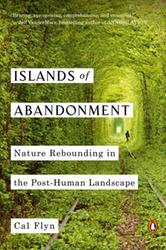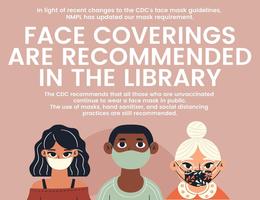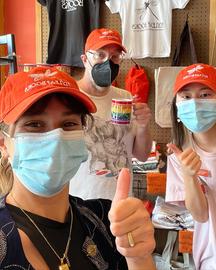That spring and summer it became impossible to glance out the window without entertaining questions of physics, of multiverses collapsing onto themselves, of time lines breaking off like Antarctic ice shelves. Was all this really happening: masks and tyrants, aerosol sprays and gun-toting clowns?
--Gary Shteyngart, Our Country Friends
Shteyngart is writing about the summer of 2020, though I read the novel this spring. Over the past two years, my reading habits have taken a turn for the worse, and I mean that in a good way... kinda. I'm not reading less, nor am I reading bad books; I just can't seem to stop reading books about the end, to varying degrees, of the world, a dystopian habit I know I share with others now.
 I think I have Reader's Covid. What are the symptoms? Well, I just finished Cal Flyn's extraordinary book Islands of Abandonment: Nature Rebounding in the Post-Human Landscape, and am currently halfway through J.G. Ballard's The Drowned World. After that on my TBR list is Mary Wollstonecraft Shelley's The Last Man.
I think I have Reader's Covid. What are the symptoms? Well, I just finished Cal Flyn's extraordinary book Islands of Abandonment: Nature Rebounding in the Post-Human Landscape, and am currently halfway through J.G. Ballard's The Drowned World. After that on my TBR list is Mary Wollstonecraft Shelley's The Last Man.
None of these works is about the Covid-19 pandemic, and yet all three portray a planet that has been lethally compromised by human habitation, so there's that. Flynn's book explores nature's reclamation of toxic landscapes like Chernobyl or the Salton Sea, offering occasional, if still unnerving, shreds of optimism: "We are in the midst of a huge, self-directed experiment in rewilding. Because abandonment is rewilding, in a very pure sense, as humans draw back and nature reclaims what was once hers."
 In addition to worrying slightly about the potential side effects of my current reading habits, I also find myself wondering where all the masked readers have gone. Just yesterday, the Pew Research Center released a survey reporting that only 48% of respondents now say wearing masks around people indoors has been extremely or very effective at limiting the spread of the coronavirus, while the remainder describe masking up as no more than somewhat effective.
In addition to worrying slightly about the potential side effects of my current reading habits, I also find myself wondering where all the masked readers have gone. Just yesterday, the Pew Research Center released a survey reporting that only 48% of respondents now say wearing masks around people indoors has been extremely or very effective at limiting the spread of the coronavirus, while the remainder describe masking up as no more than somewhat effective.
A few months ago, I wrote a short piece highlighting books that could be considered part of a developing Covid-19 pandemic lit genre. "Watch for masks," I suggested. "I still mask up regularly and take note of face masks appearing more often in the books I'm reading."
"We Know You've (Probably) Ditched Your Face Mask, but It's Time to Dig It Out" was a headline in yesterday's HuffPost UK: "Go on the bus, the train, or head to any social gathering and you're unlikely to see many face masks today. A year ago, the view was completely different, and the year prior even more so. Since the relaxation of Covid rules, many of us have developed a pretty lax attitude to wearing facial protection when we're out and about. And we get it, it's nice to pretend Covid doesn't exist sometimes."
"Who was that masked man?" townsfolk in the Old (as seen on TV) West used to ask when the Lone Ranger rode away. "Wearing that mask, Clayton Moore became one of the most recognizable characters on the planet," Roy Peter Clark wrote in the summer of 2020. "Until the end of his life, he wore it with honor. If he were alive today, I bet he'd be wearing not one but two masks--both designed to save lives and help others."
Inspired to take action, I scrolled through social media posts in search of book trade face masks. I saw plenty of smiling faces--authors, booksellers, customers, publishing folks--and that was lovely, but I only turned up a half-dozen masked booksters. I know many booksellers are still wearing masks and bookshops have modified face mask policies, but the ubiquity has gone.

|
|
| Michael McCann at Gallery Bookshop | |
Scottish bookseller Michael McCann, who recently opened the Gallery Bookshop in Glasgow, told the Herald that he runs the business almost single-handedly and has requested that customers wear masks in an effort to help him avoid having to take time off work due to Covid, which he says could leave him with no option but to close. Linking to the article, McCann tweeted: "Right Michael, Do NOT do or say anything to upset anyone about Cov....... Shit!"
Maybe it's time to reread The Experience of Landscape, in which Jay Appleton explores the Prospect-Refuge theory through the lens of our oldest instincts for survival, as applied to our aesthetic experience of landscape. Consider one of your ancestors. Squatting near his morning blaze at the mouth of a cave, he surveys distant terrain--maybe open land, maybe high grass, maybe trees, maybe undergrowth--that might camouflage life-threatening hazards... and, hopefully, food.
 |
|
| Masking up at Flyleaf Books | |
A good provider, he makes calculations: the family's survival depends on how far he's willing to venture out on the open savanna, or into the forest, to hunt and gather. Stay in the cave too long and his family dies of hunger. Go too far away from it and he becomes prey. That he survived long enough to keep threads of your DNA going is a testament to his ability to strike a balance between the two.
I make similar calculations with mask wearing. Covid-19 is still hunting us. I wake each morning and squat near my cave entrance, calculating the risks of a grocery store run. Refuge and prospect.
On July 2, 2020, I asked: "How does an independent bookseller celebrate Independence Day during a global pandemic? By masking up and handselling great reads at the proper social distance, damn it!" And what did the future hold for that writer? Well, here he is, two years later, still masked and reading dystopically.

